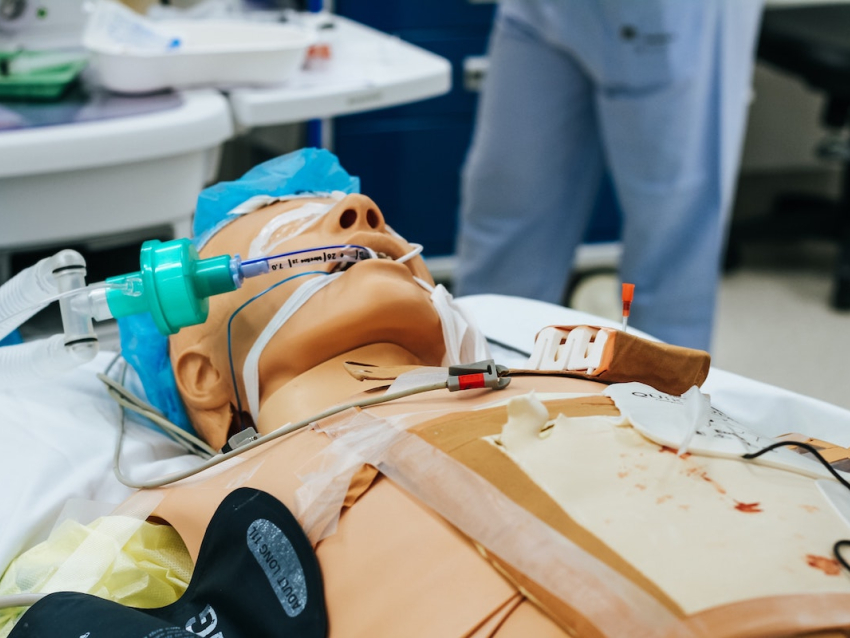
UKCOP Students Tested in Mock Disaster, Earn Emergency Response Certification
Imagine for a moment...
It’s early April in the Bluegrass. The cold and grey of winter has begun to melt away to reveal glorious Kentucky blue skies. The air is fresh and crisp and inviting. There is no place you’d rather be than Red River Gorge, hiking out to that waterfall you adore along the Rock Bridge Trail.
You fill your Yeti Rambler to the brim, lace up your hiking books, and hop in the car. An hour later, you are winding your way through country roads as you approach the Daniel Boone National Forest. The peaceful drive is relaxing and your mind wanders to the sounds of white water and brittle twigs crunching underfoot.
Suddenly, a car comes into sight and the squeal of tires on pavement roughly shakes you out of your peaceful daydream. It comes around the bend in front of you, taking the turn far too quickly, and loses control. You slam on your brakes and manage to avoid a collision, but the other car careens off the side of the road.
You gather yourself for a moment and take inventory. Your heart is beating wildly and the contents of your vehicle are scattered, but you are okay. You look towards the other car and see it crumpled against a tree. Someone has emerged from the passenger side, clearly injured and disoriented, but mobile.
You reach for your cell phone and quickly dial 911 as you run to the car to help. The driver is unconscious and hurt and there is a child in the back seat crying uncontrollably. The EMTs say they think they can find you on that country road and expect to be there in 12 minutes, but what do you do until then?
We are all naturally inclined to help in situations like this, but we are not naturally prepared to provide medical and psychological first aid.
There are many instances when the arrival of first responders – police, fire, and medical professionals – will be delayed. In these cases, bystanders can act to minimize injury and save lives. The Federal Emergency Management Agency (FEMA) developed the Community Emergency Response Team (CERT) program to train citizens to provide basic medical assistance and reduce the risk of further injury after accidents and natural disasters.
Lexington, Kentucky has offered CERT training to the general public for many years. This fall, the program graduated its first class of UK College of Pharmacy PharmD students. Students earned their CERT certification and credit towards their degrees by completing this elective course.
Dr. Regan Baum, Assistant Professor at the UK College of Pharmacy, coordinated the inaugural class. “Pharmacists serve vital roles and are essential healthcare providers when disasters happen, “said Dr. Baum. “This independent study is designed to prepare future pharmacists to assist their communities, families and selves, allowing them to safely and efficiently return to work during times of emergent need to help serve communities during a disaster.”
The students participated in a 9-week course covering topics including triage, basic medical care, psychological first aid, search and rescue, and terrorism, as well as an issue of special local concern, the Chemical Stockpile Emergency Preparedness Program (CSEPP). At the end of the program, students were tested in a realistic, high-stress mock disaster at the Lexington Fire Department Training Center.
During the mock disaster, program participants were challenged to rescue more than 15 victims of an F4 tornado from a 2-story building. The unfamiliar landscape provided a number of challenges including two large fires, darkness due to an ‘electrical outage’ in the building and the setting sun, and debris from the tornado. Injuries ranged from scrapes and bruises, to major amputations, and fatalities. “It was so realistic that all perceptions of time were lost. The panic, intensity, fear, chaos all felt real, “said Dr. Baum. “This was just a drill, but it left such a heavy impression on me. I have always had a very high level of respect for our emergency responders, but participating in this has given me an even greater appreciation of their service.”
Students participating in the course were likewise moved by the experience. “I thought that the disaster experience was very eye opening,” said Erin Deja, PharmD student. “It's easy to think that you're prepared for something, but when you're in the moment with people screaming at you and refusing to cooperate, it can be difficult to perform the skills that you're taught well or even at all.”
Dr. Baum noted the value of the experience for Pharmacists, especially those that hope to work in hospital settings. “This experience taught our team a lot of things, invaluable skills, the importance of preparation, safety, communication. In the hospital setting, we are so used to having endless resources for every patient. A mindset change is required in a mass causality event. We talk about this when we make our protocols and speak about what our actions and plans will be. In action, I found this to be much harder than realized. Our main goal was always safety first, and do the best you can for the largest number of people. The weight of knowing you don’t have the resources to save an injured person, and that you must move on is hard to come to grips with.”
This experience prepared students for the rare but challenging experiences that may face in their careers and personal lives. “It is our responsibility to be prepared,” notes William Gayhart, PharmD student. “I feel as though the CERT curriculum prepared me well for dealing with a potential disaster.
CERT classes are offered each year and are open to all Lexington citizens over the age of 18. PharmD students interested in registering for this elective are encouraged to contact Regan Baum at Regan.Baum@uky.edu. All others may reach out to Shelley Bendall at (859) 280-8063 or sbendall@lexingtonky.gov.
For more information, please visit:
